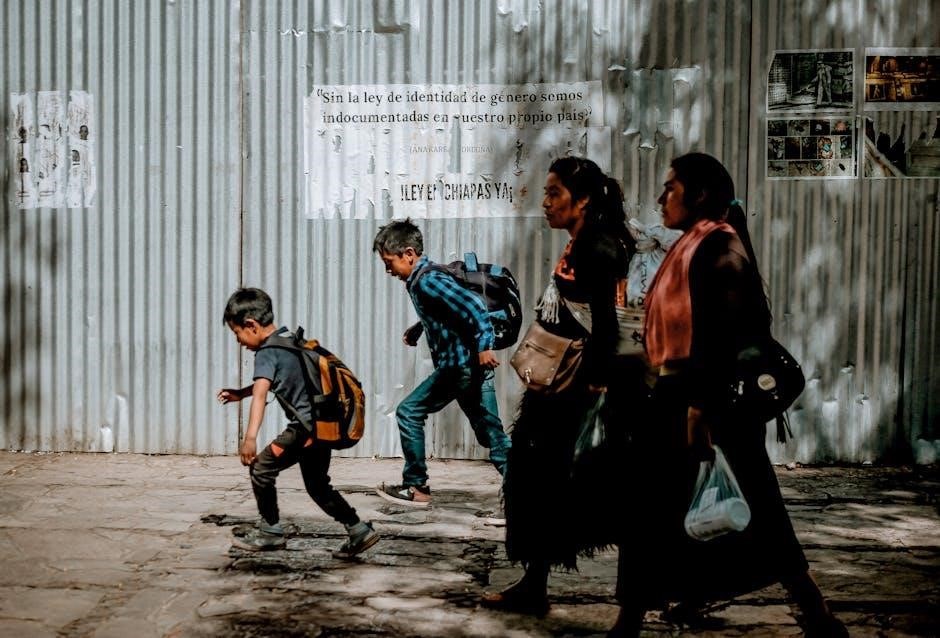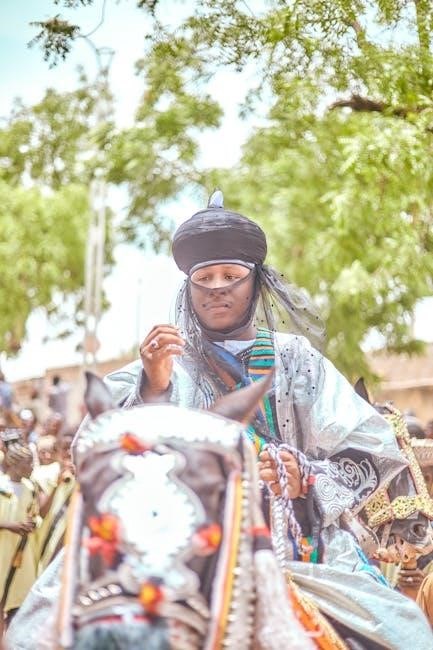Native Son: An In-Depth Analysis
Richard Wright’s Native Son offers a stark portrayal of racism and its devastating psychological impact on Bigger Thomas in 1930s America. This in-depth analysis will explore the novel’s themes‚ characters‚ and symbolism‚ examining its lasting impact as a social protest novel.
Overview of Native Son
Native Son‚ a powerful and controversial novel by Richard Wright‚ plunges into the depths of racial prejudice and oppression in 1930s America. The narrative centers on Bigger Thomas‚ a young Black man navigating a society rife with systemic racism and limited opportunities.

Wright’s unflinching portrayal of Bigger’s experiences and the societal forces that shape his destiny has made Native Son a significant work of American literature. The novel explores the psychological toll of racism‚ the constraints placed upon Black individuals‚ and the desperate measures they may resort to in a society that offers them little hope.
Native Son is not merely a story about one man’s struggle; it is a social commentary that challenges readers to confront the uncomfortable realities of racial inequality. Through vivid characters‚ stark realism‚ and powerful symbolism‚ Wright compels us to examine the complex interplay between individual agency and societal forces. The novel’s enduring relevance lies in its ability to spark dialogue about race‚ justice‚ and the human condition.

The story delves into Bigger’s accidental murder of Mary Dalton‚ a white woman‚ and the subsequent chain of events that lead to his capture and trial. Wright masterfully weaves themes of fear‚ violence‚ and social injustice throughout the narrative.
Richard Wright’s Biography and Context
Richard Wright‚ born in 1908 in Mississippi‚ experienced firsthand the harsh realities of racial prejudice and poverty in the Jim Crow South. This formative period deeply influenced his writing‚ shaping his commitment to exposing the systemic injustices faced by Black Americans.
Wright’s personal journey took him from the segregated South to Chicago‚ where he became involved in the Federal Writers’ Project and the Communist Party. These experiences broadened his understanding of social and political issues‚ further fueling his desire to challenge the status quo through literature. His time in the Communist Party gave him insight into social structures.
Native Son‚ published in 1940‚ emerged from this rich and complex background. The novel reflected Wright’s deep understanding of the social‚ economic‚ and psychological forces that shaped the lives of Black individuals in America. It was a product of its time‚ reflecting the anxieties and tensions of a nation grappling with racial inequality during the Great Depression and the looming threat of World War II. Wright aimed to highlight the racial tensions during the Jim Crow era. Wright’s biography is essential to understanding the context and themes explored in Native Son.
His work provides a powerful indictment of the societal structures that perpetuate racism and limit opportunities for marginalized communities.
Plot Summary of Native Son
Native Son centers on Bigger Thomas‚ a young Black man living in extreme poverty in Chicago during the 1930s. Trapped by his circumstances and burdened by societal expectations‚ Bigger struggles to find meaning and purpose in a world that seems determined to oppress him.
The plot intensifies when Bigger is offered a job as a chauffeur for the wealthy Dalton family. One night‚ while driving their daughter‚ Mary‚ Bigger accidentally suffocates her in a panic. Fearful of the consequences of being caught with a white woman‚ he disposes of her body‚ setting off a chain of events that spiral out of control.
Bigger’s actions lead to a city-wide manhunt‚ fueled by racial prejudice and sensationalized media coverage. He becomes a symbol of Black criminality in the eyes of many‚ further solidifying the racial divide in Chicago. While on the run‚ Bigger commits another murder‚ this time of his girlfriend‚ Bessie‚ in an attempt to silence her.
Eventually‚ Bigger is apprehended and put on trial. His defense lawyer‚ Max‚ attempts to argue that Bigger’s actions are a product of the oppressive environment in which he was raised‚ but the court ultimately finds him guilty and sentences him to death. The novel concludes with Bigger awaiting his execution‚ grappling with the meaning of his life and the forces that led to his tragic fate.
Bigger Thomas: Character Analysis
Bigger Thomas‚ the protagonist of Native Son‚ is a complex and controversial figure‚ embodying the tragic consequences of systemic racism and societal oppression. He is portrayed as a young Black man struggling to navigate a world that offers him limited opportunities and constantly reinforces his sense of inferiority.
Bigger is characterized by his deep-seated fear‚ anger‚ and frustration‚ stemming from the constant awareness of his marginalized status. He feels trapped by his environment and lacks the agency to shape his own destiny. This sense of powerlessness leads him to lash out in acts of violence‚ which can be interpreted as desperate attempts to assert control over his life.
Despite his flaws and violent tendencies‚ Bigger is not presented as a purely evil character. Wright delves into the psychological factors that contribute to his behavior‚ highlighting the impact of poverty‚ discrimination‚ and the constant threat of racial violence. Bigger’s actions can be seen as a product of the oppressive environment in which he was raised‚ a society that has systematically denied him opportunities and dehumanized him.
Ultimately‚ Bigger Thomas serves as a symbol of the destructive consequences of racism‚ illustrating how societal forces can shape an individual’s identity and lead to tragic outcomes. He is a complex character whose actions challenge readers to confront uncomfortable truths about race‚ justice‚ and the human condition.
Racism and Prejudice in Native Son
Native Son is a searing indictment of the pervasive racism and prejudice that defined America in the 1930s. Richard Wright masterfully portrays how systemic racism shapes every aspect of Bigger Thomas’s life‚ limiting his opportunities‚ fueling his fears‚ and ultimately contributing to his tragic fate.
The novel vividly depicts the Jim Crow South’s legacy in Chicago‚ where racial segregation and discrimination are rampant. Bigger and his family are confined to a dilapidated‚ overcrowded apartment in the Black Belt‚ a stark contrast to the affluent white neighborhoods. This physical segregation symbolizes the deep social and economic divide between the races.
Racism manifests in various forms throughout the novel‚ from the subtle microaggressions Bigger experiences in his daily interactions to the overt acts of violence and discrimination he faces from law enforcement and society at large. He is constantly reminded of his inferior status‚ reinforcing his feelings of powerlessness and resentment.
Wright also explores the psychological impact of racism on Bigger‚ highlighting how it distorts his perception of the world and shapes his identity. Bigger internalizes the racist stereotypes that society projects onto him‚ leading to self-hatred and a sense of alienation. The novel serves as a powerful reminder of the devastating consequences of racism on individuals and communities‚ urging readers to confront the ongoing struggle for racial justice.
Fear and Violence as Themes
Fear and violence are central‚ inextricably linked themes in Richard Wright’s Native Son‚ driving the narrative and shaping Bigger Thomas’s actions. The pervasive atmosphere of fear‚ born from racial prejudice and systemic oppression‚ permeates Bigger’s existence‚ dictating his choices and fueling his violent outbursts.
Bigger’s fear is multifaceted. He fears the white world‚ which he perceives as a constant threat‚ ready to punish him for any transgression‚ real or imagined. He fears poverty and the limitations it imposes on his life. He fears his own impulses and the potential for violence that simmers beneath the surface.

Violence‚ in Native Son‚ is both a product of fear and a means of coping with it. Bigger’s accidental murder of Mary Dalton is a direct result of his fear of being discovered in her room‚ a fear rooted in the racial dynamics of the time. His subsequent actions‚ including the murder of Bessie‚ are desperate attempts to escape the consequences of his initial act‚ further escalating the cycle of violence.
Wright does not condone Bigger’s violence‚ but he seeks to understand its origins‚ portraying it as a tragic consequence of the oppressive environment in which Bigger lives. The novel challenges readers to confront the uncomfortable truth that fear and violence are often intertwined‚ particularly in societies marked by racial inequality and injustice.
Social Commentary in Native Son
Native Son serves as a powerful and unflinching social commentary on the systemic racism and oppression prevalent in 1930s America. Richard Wright uses Bigger Thomas’s tragic story to expose the deeply ingrained inequalities that trap Black individuals in a cycle of poverty‚ fear‚ and violence.
The novel critiques the social structures that deny Black people opportunities for advancement‚ limiting their access to education‚ employment‚ and housing. Bigger’s lack of options and the constant threat of discrimination contribute to his sense of alienation and powerlessness. Wright highlights how society’s prejudices shape Bigger’s identity and limit his potential.
Native Son also examines the role of the legal system in perpetuating racial injustice. Bigger’s trial and the overwhelming presumption of his guilt underscore the biases that permeate the justice system. The novel suggests that Black individuals are often denied fair treatment and are judged more harshly than their white counterparts.
Furthermore‚ Wright challenges the prevailing stereotypes and dehumanizing portrayals of Black people in American society. He seeks to humanize Bigger‚ exploring his inner thoughts and motivations‚ even as he commits horrific acts. By doing so‚ Wright forces readers to confront the complex realities of racial inequality and the devastating consequences of systemic oppression.
Psychological Turmoil of Bigger Thomas
Richard Wright masterfully portrays the profound psychological turmoil that plagues Bigger Thomas throughout Native Son. Growing up under the oppressive weight of racial prejudice in 1930s America‚ Bigger is burdened with a deep-seated conviction that he has no control over his own life. This sense of powerlessness fuels his fear‚ anger‚ and ultimately‚ his destructive actions.
Bigger’s psychological state is further complicated by his internal conflict. He desires freedom and autonomy but feels trapped by societal expectations and limitations. This tension manifests as a volatile mix of aggression and self-doubt. He struggles to articulate his emotions and often resorts to violence as a means of asserting himself in a world that constantly devalues him.
The accidental murder of Mary Dalton triggers a descent into further psychological distress; Bigger’s actions are driven by panic and fear‚ as he attempts to conceal his crime and evade the consequences; He becomes increasingly isolated and paranoid‚ struggling to maintain his composure under intense pressure.
As the novel progresses‚ Bigger grapples with feelings of guilt‚ remorse‚ and a growing awareness of the implications of his actions. He is forced to confront the harsh realities of his existence and the limitations imposed upon him by society. Wright delves into the depths of Bigger’s psyche‚ revealing the complex and often contradictory emotions that drive his behavior.

Symbolism in Native Son
Richard Wright’s Native Son is rich with symbolism‚ enhancing the novel’s exploration of race‚ oppression‚ and the psychological impact of systemic injustice. The most potent symbols in the novel serve to underscore Bigger Thomas’s alienation and the dehumanizing effects of racism in 1930s America.
The color black itself operates as a central symbol‚ representing not only Bigger’s race but also the darkness of his circumstances and the limited opportunities available to him. It also symbolizes fear‚ ignorance‚ and the unknown‚ all of which contribute to Bigger’s actions and mindset.
Conversely‚ the color white‚ particularly associated with the Dalton family‚ symbolizes the dominant power structure and the perceived purity and privilege of white society. The blinding snow that often appears in the novel serves as a metaphor for the suffocating and oppressive nature of this power structure‚ obscuring Bigger’s vision and limiting his choices.
The rat that Bigger kills at the beginning of the novel can be interpreted as a symbol of his own trapped and desperate existence. Like the rat‚ Bigger feels cornered and reacts with violence as a means of self-preservation. The furnace in the Dalton’s basement‚ where Bigger disposes of Mary’s body‚ represents the destructive forces of racism and the burning rage that consumes Bigger from within.
The Role of Communism
Communism plays a complex and multifaceted role in Richard Wright’s Native Son‚ serving as both a potential solution to the systemic injustices faced by African Americans and a source of controversy and debate within the narrative. The novel explores the appeal of communist ideology to individuals like Bigger Thomas‚ who are marginalized and oppressed by a capitalist society.
Through characters like Jan Erlone and Mary Dalton‚ Wright introduces the principles of communism as a challenge to the prevailing racial and economic hierarchies. Jan‚ a communist activist‚ attempts to connect with Bigger and offer him an alternative worldview that emphasizes equality and collective action. Mary’s naive and idealistic embrace of communism further highlights the potential for social change‚ albeit in a somewhat misguided manner.
However‚ Wright also presents a critical perspective on communism‚ acknowledging its limitations and potential for manipulation. Bigger’s initial attraction to communism stems more from a desire for belonging and a rejection of the status quo than from a genuine understanding of its principles. His involvement with the Communist Party is ultimately superficial‚ and he struggles to reconcile its ideals with his own violent actions.

Ultimately‚ the role of communism in Native Son is to provoke thought about alternative social structures and to expose the limitations of existing systems. It offers a glimmer of hope for a more just society‚ but also underscores the complexities and challenges of achieving true equality.
Critical Reception and Controversy
Native Son ignited immediate controversy upon its publication in 1940‚ eliciting strong reactions from both critics and the general public. Richard Wright’s unflinching portrayal of racism and violence in America sparked intense debate about the novel’s merits and its potential impact on race relations.
Some critics lauded Wright’s courageous exploration of the systemic oppression faced by African Americans‚ praising his powerful prose and his ability to capture the psychological complexities of Bigger Thomas. They recognized Native Son as a groundbreaking work that challenged prevailing racial stereotypes and forced readers to confront uncomfortable truths about American society.
However‚ other critics condemned the novel for its graphic violence and its perceived endorsement of criminal behavior. They argued that Bigger Thomas was an unsympathetic character and that Wright’s portrayal of him reinforced negative stereotypes about Black men. Some critics also objected to the novel’s explicit language and its frank discussion of sexuality.

The controversy surrounding Native Son extended beyond literary circles‚ with some groups attempting to ban the book from libraries and schools. Despite the opposition‚ the novel became a bestseller and a critical success‚ solidifying Wright’s reputation as a major American writer. The debates surrounding Native Son continue to this day‚ highlighting the enduring power of literature to provoke dialogue about race‚ justice‚ and social change.
Native Son’s Impact on Literature
Richard Wright’s Native Son left an indelible mark on American literature‚ paving the way for future generations of Black writers to explore themes of race‚ identity‚ and social justice with unprecedented candor. The novel’s unflinching portrayal of systemic racism and its psychological effects on Bigger Thomas challenged the prevailing literary conventions and opened up new possibilities for representing the Black experience in America.
Native Son influenced countless writers who followed‚ inspiring them to confront difficult issues and to create complex‚ multifaceted characters that defied easy categorization. The novel’s impact can be seen in the works of James Baldwin‚ Ralph Ellison‚ Toni Morrison‚ and many others‚ who built upon Wright’s legacy by exploring the nuances of Black life in America with depth and sensitivity.
Beyond its thematic influence‚ Native Son also had a significant impact on literary style. Wright’s use of naturalism and psychological realism allowed him to depict the inner turmoil of Bigger Thomas with remarkable clarity‚ creating a powerful and immersive reading experience. His innovative narrative techniques inspired other writers to experiment with form and language in order to better capture the complexities of human experience.
Native Son remains a touchstone of American literature‚ a testament to the power of storytelling to challenge injustice and to promote understanding across racial divides. Its enduring legacy is a reminder of the ongoing struggle for equality and the importance of amplifying marginalized voices in the literary landscape.
Comparison to Dostoevsky’s Crime and Punishment
Richard Wright’s Native Son invites comparison to Fyodor Dostoevsky’s Crime and Punishment through their shared exploration of murder‚ guilt‚ and the psychological torment of the perpetrator. Both novels delve into the minds of their protagonists‚ Bigger Thomas and Rodion Raskolnikov‚ as they grapple with the consequences of their actions and the weight of their consciences.

While both characters commit murder‚ their motivations differ significantly. Raskolnikov‚ driven by a warped sense of intellectual superiority and a desire to test his own limits‚ sees himself as an “extraordinary” individual above conventional morality. Bigger‚ on the other hand‚ is a product of systemic oppression and racial prejudice‚ his actions fueled by fear‚ desperation‚ and a lack of opportunity.
Both novels explore the theme of alienation‚ as both Bigger and Raskolnikov find themselves isolated from society and struggling to connect with others. However‚ their experiences of alienation are shaped by different forces. Raskolnikov’s alienation stems from his intellectual arrogance and his rejection of societal norms‚ while Bigger’s alienation is a result of the racism and discrimination he faces as a Black man in America.
Despite their differences‚ both Native Son and Crime and Punishment offer profound insights into the human condition‚ exploring the complex interplay of individual agency‚ social forces‚ and the enduring power of guilt and redemption. Both novels challenge readers to confront uncomfortable truths about themselves and the societies in which they live.
Native Son as a Social Protest Novel
Richard Wright’s Native Son stands as a powerful example of a social protest novel‚ directly confronting the systemic racism and social injustices prevalent in 1930s America. Through the tragic story of Bigger Thomas‚ Wright exposes the devastating impact of poverty‚ oppression‚ and prejudice on the lives of Black individuals‚ challenging readers to confront the uncomfortable realities of a deeply divided society.
The novel critiques the social structures that limit Bigger’s opportunities and force him into a cycle of fear and violence. Wright portrays Bigger not as an inherently evil individual‚ but as a product of his environment‚ shaped by the pervasive racism and lack of access to education and economic advancement. Bigger’s actions‚ though reprehensible‚ are presented as a desperate response to a society that has systematically denied him agency and dignity.
Native Son serves as a condemnation of the Jim Crow era‚ highlighting the dehumanizing effects of segregation and the constant threat of violence faced by Black Americans. Wright uses Bigger’s story to expose the psychological toll of living under constant fear and the ways in which racism can warp an individual’s sense of self.
By forcing readers to confront the brutal realities of racial inequality‚ Native Son aims to spark social change and challenge the status quo; The novel’s enduring power lies in its unflinching portrayal of the human cost of prejudice and its call for a more just and equitable society. It remains a vital text for understanding the ongoing struggle for racial justice in America.
Study Guide Resources for Native Son
For students and readers seeking a deeper understanding of Richard Wright’s Native Son‚ a wealth of study guide resources are available to enhance comprehension and critical analysis. These resources offer valuable insights into the novel’s complex themes‚ characters‚ and historical context‚ providing a framework for engaging with the text on multiple levels.
Comprehensive study guides often include chapter summaries‚ character analyses‚ and explorations of key themes such as racism‚ fear‚ and social injustice. They may also provide historical background on the Jim Crow era and the social conditions that shaped Bigger Thomas’s life.
Literary essays and critical analyses offer diverse perspectives on the novel’s meaning and significance‚ examining Wright’s use of symbolism‚ narrative techniques‚ and psychological realism. These resources can help readers develop their own interpretations of the text and engage in thoughtful discussions about its enduring relevance.

Online resources such as SparkNotes and CliffsNotes provide concise summaries‚ character analyses‚ and quote explanations‚ offering a quick and accessible overview of the novel’s key elements. These resources can be particularly helpful for students preparing for quizzes‚ tests‚ and essays.

In addition to these resources‚ many academic websites and libraries offer access to scholarly articles‚ book reviews‚ and critical essays on Native Son‚ providing a deeper dive into the novel’s literary and historical significance. By utilizing these various study guide resources‚ readers can gain a more nuanced and comprehensive understanding of Wright’s powerful and enduring work.
